REMEMBERING KARUPPIAH
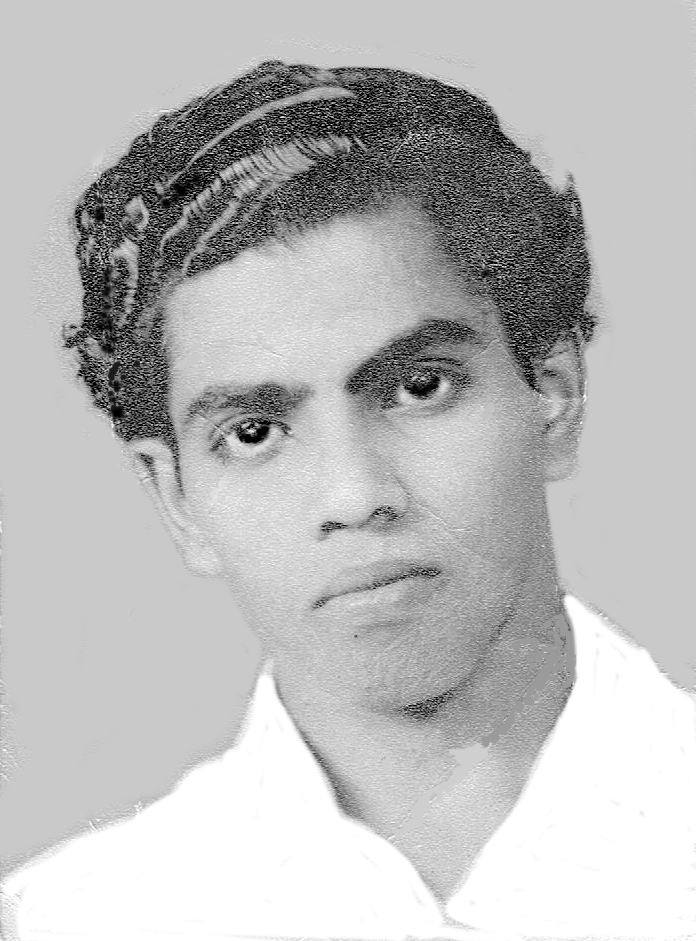
REMEMBERING KARUPPIAH
28 April 1931 to 24 May 1992
This is a story of Mr. P. Karuppiah, a Tamil school teacher who became a Bahá’í in 1961 and served the Faith with great devotion and fortitude. The history of the Faith in the town of Muar can never be written without ample mention about this firm, faithfuland loyal servant of Bahá’u’lláh.
It was on 11 March 1961 that Karuppiah accepted the Faith through the teaching efforts of the friends from Malacca. His enthusiasm led him to organize several more firesides with Malacca providing the speakers. In accepting the Faith, Karuppiah was clear in his mind about the path that he had chosen for himself, and he was determined to live life to the best of his ability. He immediately started to put to practice whatever little he had understood on the Faith.
It was astonishing that Karuppiah gained a deep understanding of the Faith quite fast. At the firesides, he listened attentively to the Bahá’í speakers and entered into lengthy discussions with the visiting Bahá’ís. He became an avid reader and was reading whatever literature was made available to him. Although he was a Tamil school teacher, he had a fairly good knowledge of the English language as well. The example set by the string of visitors to Muar town, especially from Malacca, such as Leong Tat Chee, Raymond Peter, S. Vasudevan, Surinder Singh, and Bhaskaran moved him. He saw that they practiced what they preached, and that too touched him deeply. A Local Spiritual Assembly was elected during Ridván 1961. William Koren, Headmaster of Maharani School was elected Chairman, Karuppiah as its Secretary and Inyce Koren as Treasurer. Local Spiritual Assembly meetings were held at the home of William Koren at Lorong Sekolah. Karuppiah felt very comfortable moving with Miss Inyce Koren and her brother William Koren hailing from the middle class. In the very first year of the acceptance of the Faith, Karuppiah participated in almost all meetings in Muar.
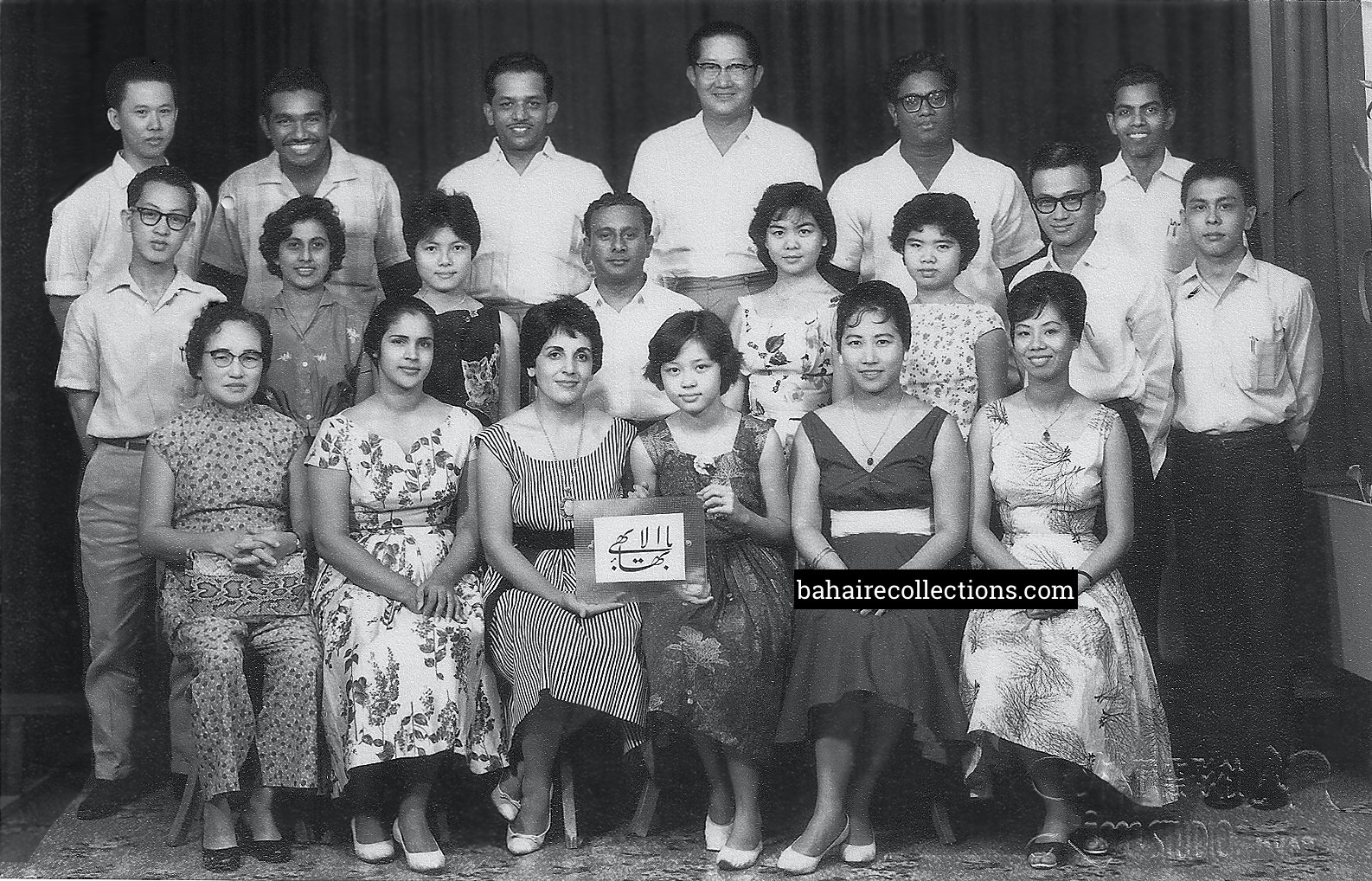
Some believers of Malacca and Muar with Mrs. Shafiqi Fatheazam, 1961. Seated (L-R) Mrs. Leong Tat Chee, Mrs. Betty Fernandez, Mrs. Shafiqi Fatheazam, (unknown), Mrs. Lily Chinniah, Koh Ai Leen. Second from the left in the middle row is Miss Inyce, and at the center of the same row is William Koren. Back row – Raymond Peter is second from left, E.A. Fernandez third from left, Leong Tat Chee fourth from left. Standing at the extreme right at back row is Karuppiah
Now comes informing his wife of his acceptance of the Faith in 1962. Karuppiah at first never informed his wife Ponnayee that he had become a Bahá’í. It so happened that one-day Karuppiah bought home some meat and requested his wife to cook for dinner in March 1962. When he told her that he was fasting, his wife wondered what he was talking about. To her, fasting according to her Hindu belief was to consume only vegetarian food. When she asked for further clarification, Karuppiah did not disclose much but told her just to cook and added that he would be fasting for 19 days. That evening she noticed Karuppiah was holding a prayer book and saying prayers with a glass of water with Tulsi leaf (basil leaf) inside. The Tulsi leaf was used as an herbal treatment in the Indian community. After prayers, Karuppiah broke the fast with this water and ate dinner his wife had prepared. That was his first fasting after he had accepted the Faith.
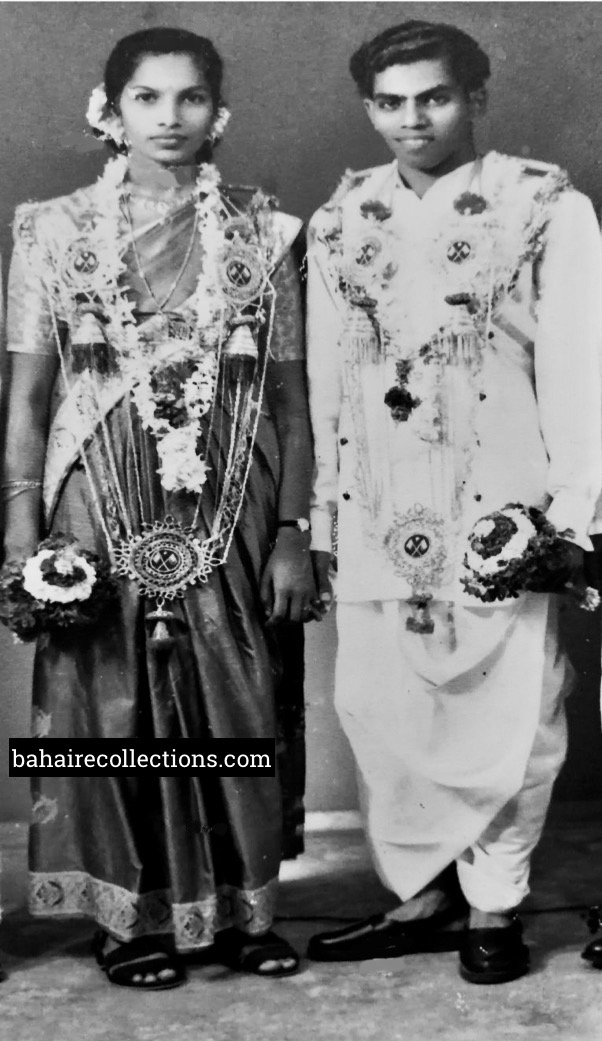
Marriage on 17 March 1956
Mrs. Ponnayee started to see some dramatic changes in her husband and was curious to learn of the source of these changes. One day when Karuppiah explained to her about the Bahá’í Faith that he had accepted, she expressed happiness, as by then she had seen many changes in him. When Karuppiah asked her if she would accept the Faith, she hesitated saying she was not literate in English. When Karuppiah explained that acceptance of the Faith was not conditional upon knowledge of any language, she signed the Bahá’í declaration card. Karuppiah was happy that with his wife accepting the Faith as he could now build a Bahá’í family with her support. Mrs. Ponnayee joined him in establishing a good Bahá’í family. She too served in the Local Spiritual Assembly for a few years.
A COMMUNITY LEADER IN THE MAKING
Then came the expected-opposition, crisis and final victory. It was a big decision for him to have accepted the Faith at a time when he was deeply involved and holding high positions in several social organizations and was held in high esteem for his commitment toward the Indian community. But Karuppiah’s acceptance of the Faith was not without criticism or condemnation. As soon as Karuppiah accepted the Faith he drew criticism from several groups in which he was associated. Muar town with a large base of Indians with several organizations saw in Karuppiah a great potential and resourcefulness. The leaders of those organizations too kept persuading him, at times in irate tone, to return to their fold and join them in their pursuits. One and all they rose against Karuppiah – such as the politicians, his colleagues in the school, community organizations, temple committee, and the Tamil Youth Bell Club, to name but a few. They were concerned about having lost out a very promising and resourceful person. They had every reason to win him back.
Karuppiah was a leader in the making in the Muar Indian community when the Faith wafted over him and changed his destiny forever. Having migrated into Malaya from Tamil Nadu in 1935 at the age of four, he studied in an English School in Johor Bahru, and later came back to Muar and attended the Adult Education in Sanmarka Sangam Tamil School. Having successfully passed his Standard Six Tamil School Government Examinations in 1946 at the age of 15, he was first assigned as a teacher at Kempos Estate, near the town of Tangkak in the state of Johor, where he served for 3 years. He then went for a teacher training course in the town of Segamat. Upon completing the training he was posted to the Nandanar Tamil School at Jalan Road (Daud Road) in the town of Muar. When the National Type Tamil School was introduced, Karuppiah was posted to the Sanmarka Sangam Tamil School at Khalidi Road in the same town of Muar, which later came to be called the National Type Tamil Primary School.
As a student, he was very keen on studies and took a great interest in sports. Even during his schooldays, Karuppiah had developed a friendship with Mr. Shanmugam Chettiar who was on the Board of Directors of the Tamil School in Muar and the late Tan Sri Dato G. Pasamanickam who was one of the high ranking figures in the Malaysian Indian Congress (MIC), a political party.
Karuppiah loved and acted in stage dramas that were staged in Muar town to raise funds to save the properties of the Indian community at Jalan Daud. As a social worker, Karuppiah was Chairman of the Muar Tamil Youth Club for many years. The Tamil Youth Clubs were spread out throughout the country to get the youths to be involved in social services. He organized a set of volunteers from the Tamil Youth Club of Muar to involve in social and welfare services in his hometown. He introduced a white uniform for the volunteer team. For many years the Muar Indian Community benefitted much from the services of these volunteers at many family functions and temple festivals. Karuppiah also valued the importance of education and gave free tuition classes in the Tamil language. He even went out of his way to assist students who had gained entrance into local universities to secure state government scholarships by approaching those in authority. He also helped to establish a branch of the National Land and Finance Co-Operative Society in Muar town. He believed in uplifting those downtrodden in society through the political platform. He worked very closely with the late Tan Sri Dato G. Pasamanickam, leader of the Malaysian Indian Congress in promoting the growth and development of the party. He was an excellent speechwriter for the leading politicians. Karuppiah was said to be instrumental in the making of many political and community leaders. He had served for many years as the secretary of the Management Committee of the Sri Muthu Mariamman Temple in Muar. He also assisted in the acquisition of the Hindu burial ground at Jalan Ismail in Muar.
Very few Indians in Malaysia had had such a wide range of experience and exposure in various aspects of social life, together with commanding high respect. In view of his background, Karuppiah was a natural choice as a community leader, who was expected to lead in the upliftment of the Indian community, predominantly through the political platform. But the Divine will had intervened to use him for His Cause.
The first blow came from the political circle. The politicians had high expectations from him. Karuppiah was expected to enter into politics where he would surely excel as a master orator with a good command of the Tamil language. But here was Karuppiah who was very much attracted to the Faith by the wonderful teachings of Bahá’u’lláh on love and unity which was amply and sincerely practiced by the Bahá’í community. It was this kind of genuine unity that he was looking for. It dawned upon him that he could not find such kind of unity in the divisive political organizations in which he was a member for several decades. He put his heart and soul for the greater and true unity of the entire mankind rather than unity his own kind. He made a firm decision to leave politics for good. This was a total disappointment to the political leaders who wanted to make use of his Tamil oratory skills. He knew that as one of the early members of the political party some kind of material rewards would come by one day had he continued to stay on. But Karuppiah was decided to give up material benefits for eternal happiness as promised by His Creator. The politicians kept visiting him in his house for months to persuade him to return to politics. Karuppiah respectfully and politely showed them the vision that Bahá’u’lláh has for the entire mankind, and that he had changed his heart from loving his kind alone to love the entire mankind. He turned all conversations into firesides and taught them the Faith. Unable to argue any further they too left him to himself. They found Karuppiah firm as a rock and left disappointed. Yet deep inside they respected him for that very firmness that he had chosen.
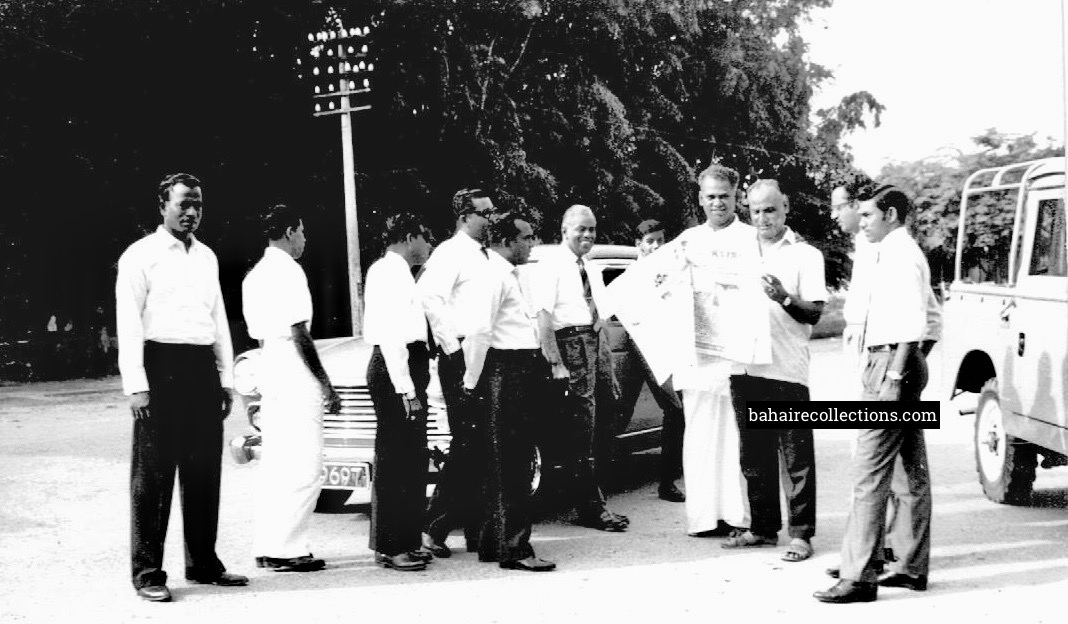
Karuppiah, second from left visited by political leaders. Tan Sri Pasamanickam is in the middle with a neck-tie. N.T.S. Arumugam Pillai is fourth from right.
The most vehement attacks were leveled against him by his colleagues in his school, whom he had to face daily. There was a widely held view in the Indian community where teachers who were held in high esteem were to play the role of custodians. It was their understanding that to change one’s religion was treachery to the community, little realizing that freedom of belief was a basic human right. They first talked to Karuppiah subtly, and when they saw him unwavering, they started to condemn him directly. When they had expected Karuppiah to retort, he smiled at them, and it was this smile and silence on his part that became the biggest weapon in silencing his critics. Mention has to be made that there had been several Tamil school teachers who had accepted the Faith, not only in Muar but throughout the country. But many left the Faith for not being able to withstand the onslaught from the community. Here was Karuppiah who was immovable as a mountain.
In the midst of all these mounting attacks, mostly mental, Karuppiah emerged victorious. Time proved that tough times do not last, but tough people do. Karuppiah was a soft-spoken person, but an unshakable rock in his belief. It was this very firmness in his faith that ultimately won the praises from the same circles that had opposed him. Karuppiah loved the Faith and made a decision which he applied for himself and urged the members of his family to follow. He pulled up all his might to live the Bahá’í life to the best of his ability as he knew he was under the spotlight of the community. He knew that one slightest deviation from the lines of the Faith would bring shame to the Faith and its Founder. Karuppiah expected all his family members to follow suit. That was his most earnest request to his family members. And certainly, it was a lifelong and painful commitment.
With his prime involvement, the Muar community organized a grand Naw-Rúz party in 1962 with the help of the Malacca friends, which attracted a huge crowd, ending up in much publicity for the Cause. That was also a new beginning for him and his family. Each year the family celebrated Naw-Rúz and invited friends, a practice that goes on to this day. Karuppiah himself was a good cook and provided the best hospitality. At times Karuppiah had prepared eight kinds of dishes for just a single guest. When the guest enquired on why the dinner had to be so lavish, Karuppiah explained that he believed in the best hospitality.
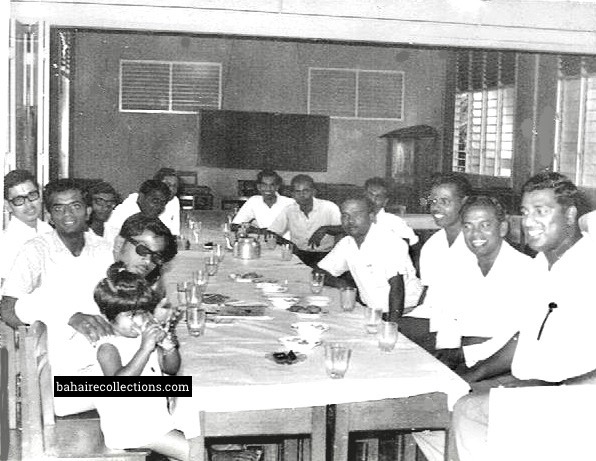
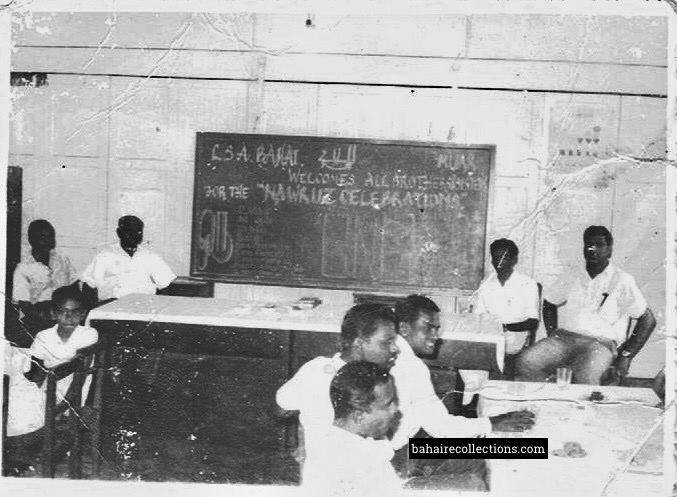
Naw-Rúz Party held in the school, 1962.
Things started to change in the middle of 1965 when Karuppiah had to hold the fort all alone. Karuppiah, Inyce, and William Koren were the backbone of the community in the early days. William Koren started to concentrate on social work from 1965, while Inyce got married and had to concentrate as a homemaker, with her husband Dr. Gopinath coming from a strong Hindu background. Likewise, many who had accepted the Faith thinking that it was some form of social organization, started to leave when they discovered that it was a religion that demanded high standards. Karuppiah started a lonely battle, emerging as the key figure in the Muar Bahá’í community. There were times he had to shoulder the responsibility of the entire community but he with his family maintained the flame of the Faith. He soldiered on relentlessly to ensure the Local Spiritual Assembly which was called the “Mother Assembly of Johor State” was re-elected year after year. And the consolidation of the friends and the community became a grave concern for him. On his own accord, he organized deepening classes for the believers and invited outstation believers to come to Muar to be speakers. Mr. Appu Raman from Kuala Lumpur had made several visits to deepen them.
One other major factor for this poor turn of affairs was the lack of reading material in the Tamil language. In order to alleviate this situation, Karuppiah took upon himself the task of translating into the Tamil language some of the Writings of Bahá’u’lláh. This document he prepared and called “Some Laws and Ordinances of Bahá’u’lláh” produced on cyclostyled papers became a great and invaluable asset among the Tamil speaking believers not only in Muar but across the country. That was one of the pioneer efforts in educating the Tamil speaking believers in Malaysia on the laws of Bahá’u’lláh and was well appreciated and admired by individuals and institutions. As Secretary of the Local Spiritual Assembly, he used to prepare newsletters, which was not common in Tamil speaking communities in those days. He would also conduct a deepening class in the Tamil language for the new believers.
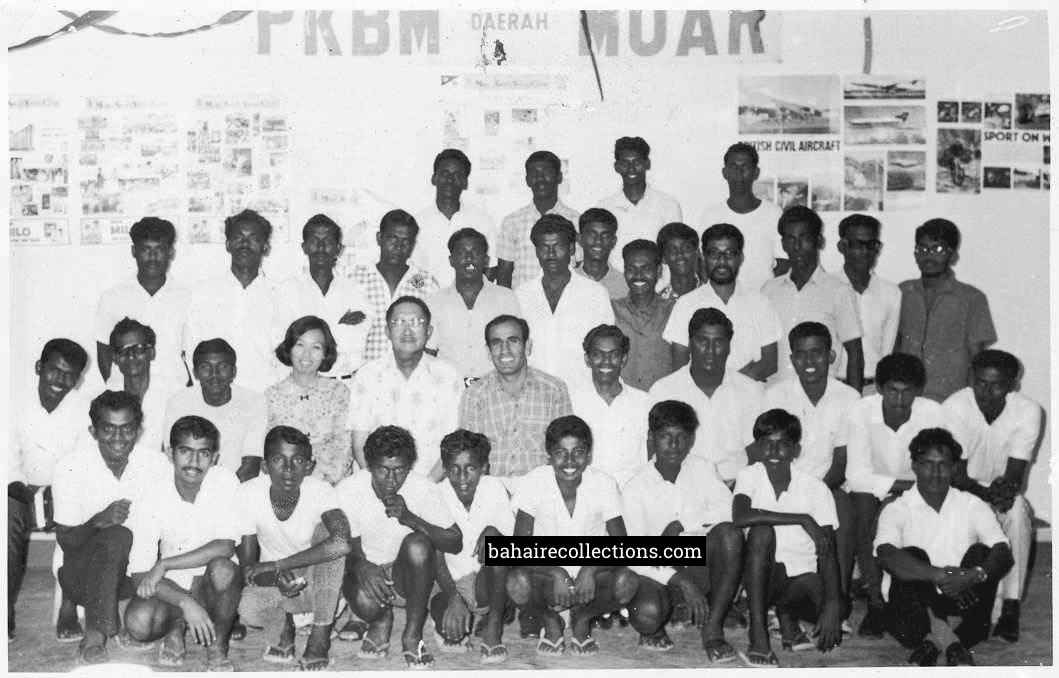
Visit in 1970 by Koh Ai Leen (seated fourth from left), Leong Tat Chee (fifth from left) and Nasser Jaffari from Thailand (sixth from left). Next to Nasser is Karuppiah.
When he had accepted the Faith, he was an ordinary Tamil school teacher. He organized small Bahá’í gatherings at his small wooden house at 27A, Jalan Khalidi in Muar. Whenever there was a need to organize large scale gatherings such as Naw-Rúz party, Teaching Conferences of meetings of Local Spiritual Assembly, Karuppiah used the Nandanar Tamil school hall at Jalan Daud as well as the hall of the Sekolah Rendah Jenis Kebangsaan Tamil at Jalan Khalidi. Later in the early 1970s as the community grew in numbers the Local Spiritual Assembly rented a house at 102, Jalan Khalidi, which became the first Bahá’í Centre of Muar town. His own house was always full of Bahá’í s, talking and laughing away whenever there was a gathering. He ensured his children attended all Bahá’í activities and took part in the physical arrangements for those activities. Whenever Feasts were held in his house he himself would cook as he was a good cook. People loved his mutton curry. And there was always ample food for all. He was generous in his hospitality. As he was well disciplined, he expected the same standard from his family members.
Although Karuppiah had left all his positions in the outside world, he was still sought for some favors, which Karuppiah obliged. One of the important events in the history of the Indians in Malaysia was the coming of Mr. C. N. Annadurai, (Chief Minister of Tamil Nadu, India from 1967 to 1969) for the First International Tamil Research Seminar in Kuala Lumpur in 1966. Taking advantage of his presence in Malaysia the community in Muar organized a gathering in his honor at the Cathay Cinema Hall. And, it was Karuppiah who was given the honor of delivering a welcome speech at that event.
Meanwhile, Bahá’ís from the outstation visited him and his family, throughout his life. Yankee Leong himself found happiness to pass a few nights in Karuppiah’s house from time to time. Later visitors from abroad such as Indonesia, Papua New Guinea, and Sarawak came and stayed in his house. There is no visitor who had come to his house and left without partaking in the tea or a meal. His hospitality was about the best, and the visitors not only felt very comfortable but also had no heart to leave.
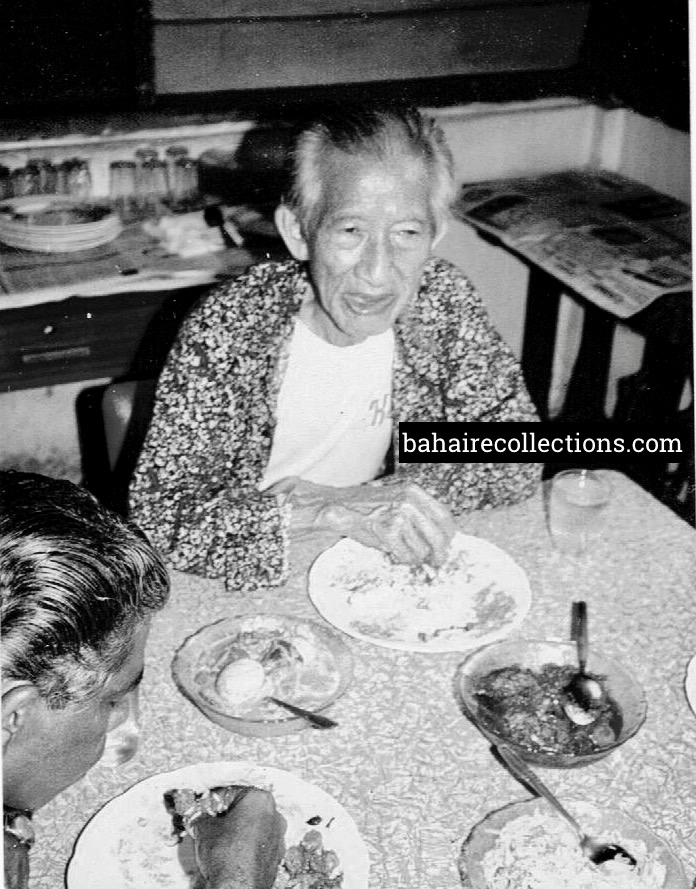
Yankee Leong, the first believer of Peninsula Malaya having a meal as a guest of Karuppiah.
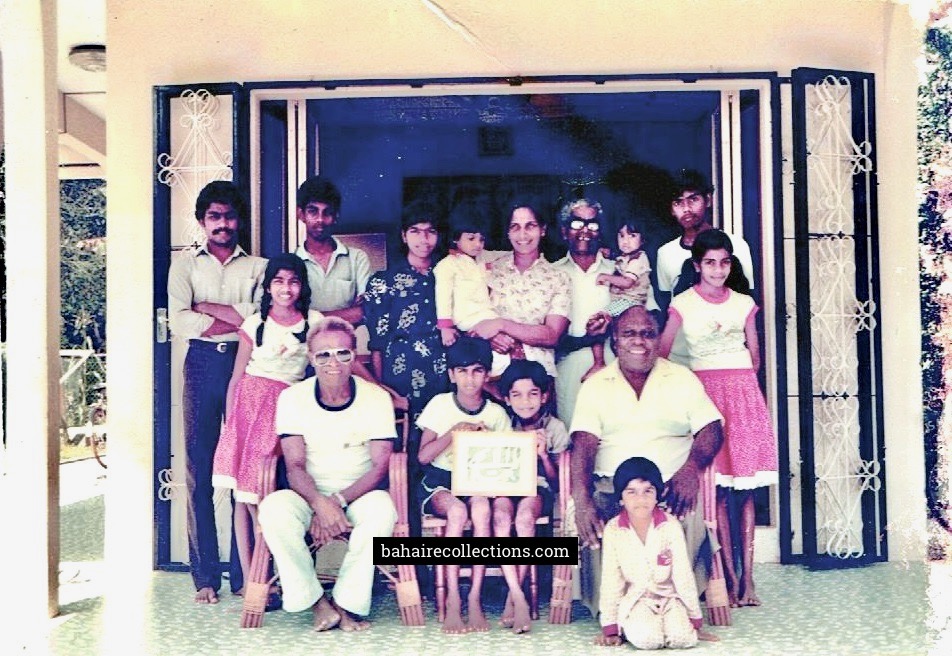
Visitor from Papua New Guinea, 1986
With a burning passion to share the message of Bahá’u’lláh, Karuppiah himself was often missing from home. Almost every day he would go out teaching after school and return home late midnight. He was able to spread the Faith in the wider community through the prior contacts he had developed. They had high regard for his loving nature, kindness, and generosity that they came to also respect the Faith he belonged to. He used to borrow a motorcycle from another teacher and a Bahá’í, Mr. Kanniah to go for teaching from one estate to another in areas surrounding the towns of Pagoh, Panchor, Air Manis, Parit Jawa, Tangkak and even as far as Jementah. Later he bought on his own a motorcycle mainly for the purpose of teaching the Cause. Karuppiah also travelled on his motorcycle to Tangkak estate in the state of Johor, Merlimau in the state of Malacca to conduct regular deepening classes.
An incident that Karuppiah used to relate to his family members as a miracle was a teaching trip that he undertook to Jementah on his motorcycle. On his return journey, it was raining heavily and his motorcycle broke down right in the middle of the jungle on an isolated road. It was pitch dark at midnight, and there were no street lights either. He tried to start the motorcycle several times and it would not start. As a lonely person in a real desperate situation, Karuppiah resorted to ardent prayers. After spending some time in prayers, he tried starting the motorcycle, and with just one kick it started. He rode the motorcycle to his home. As he entered the compound the engine stopped. As he checked the gas tank, he saw it completely empty. He froze for a moment. He entered his house and said a prayer of praise and gratitude and spent some time meditating on the unfailing help of God during moments of heedlessness. The following day he called for a meeting of all his family members and explained the incident and urged them to have full faith that Bahá’u’lláh is with us every moment of our lives and never for a moment He leaves us.
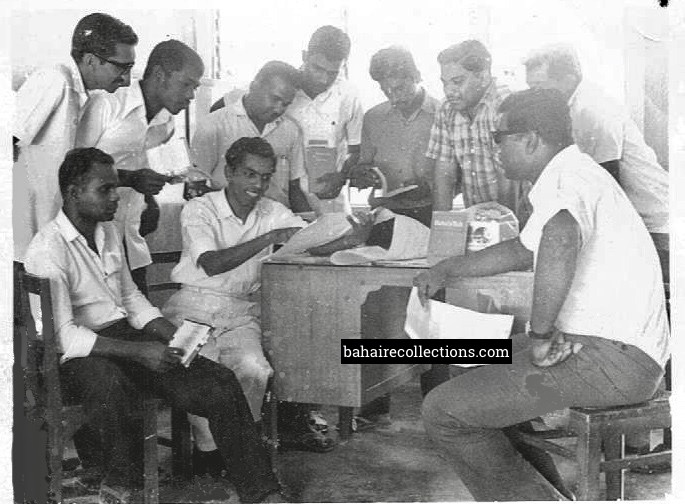
Visit by outstation believers, circa 1985. Standing L-R: S. Ravichandran (Petaling Jaya) M. Munusamy (Seremban). Satanam of Seremban is 6th from left. Seated at the extreme left is Veerasenan, with Karuppiah next to him. Seated at the extreme right is Kanniah.
While he was a kind of lone ranger in Muar, there were good moments when manpower was added. With another teacher Veerasenan accepting the Faith in 1965 during a fireside that Karuppiah arranged in which Leong Tat Chee of Malacca was the speaker, Karuppiah found some strength. Leong Tat Chee himself had come to Muar several times to visit the Bahá’ís and Karuppiah was there to take the lead in organising the gatherings. Veerasenan and Karuppiah teamed up and took the Faith to several parts of Johor state, often traveling by public transport. Within Muar, they travelled on a motorcycle. Soon there were some 30 families in the worker quarters of the Public Works Department in Jalan Baki, and Feasts were held there too. In 1979, Veerasenen left for Kulai town in Johor. Dr. Singaravelu who was posted as Medical Officer in the Government Hospital in 1973. He left for Johor Bahru after one year and returned as a specialist to the Muar District Hospital from 1980 to 1988, and he was a great asset to the community in many ways. Mr. Pichaymuthu, Mr. Shanmugam and Mr. Radhakrishnan emerged as local believers and added further strength. C. Kanagaratnam joined the community from 1980 to 1995, while K. Krishnan moved into the community in 1982. S. Nathesan moved into the community in 1985. Some remained while others moved out. The community was placed in a better footing. The community rented a Bahá’í Center in Jalan Pasamanickam and later at Jalan Hassan and finally bought their own Bahá’í Centre. By this time Karuppiah came to be respected as an elderly figure, who still remained the key contact in the community to get things moving.
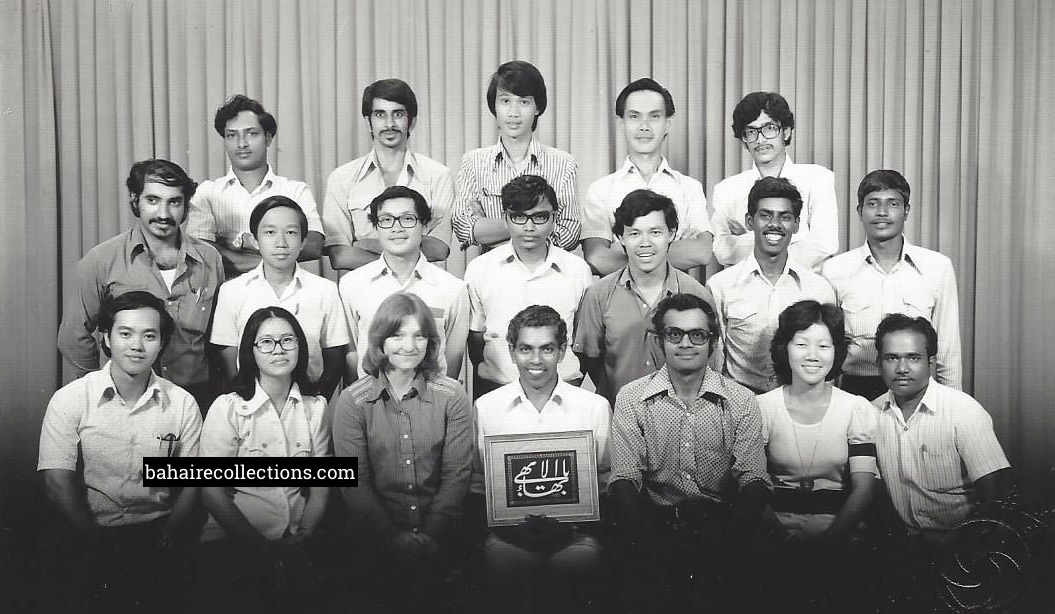
Malacca-Muar Joint Teaching Team, 1977. Sitting (L-R) Jerry Chong, Mrs. Soon Poh Lee, Jeanine Renaud, Karuppiah (holding the Greatest Name), Radhakrishnan, Fifi Hang, Veerasenan. Middle row (L-R) Baljit Singh, Ho Kam Tak, Reggie Hua, M. Ganesan, Tan Choo Tiong, Joe Ganapathy, Asokan. Standing back row (L-R) S.K. Somu, Manmohan Singh, Lim Chin Hong, Soon Poh Lee, Mageswaran
Karuppiah had a trademark description of “THE MAN IN THE WHITE” as from the very early days he was always dressed in white pants and shirts. He never gave up his white dress, as an indication of his love for purity and uprightness. Karuppiah was highly respected for his upright character and conduct for which he was never called by his first name. Instead, people addressed him as “Sir”, a reference to his teaching profession, and as an Indian customary mark of reverence to elders in society.
Karuppiah led a simple life and managed to bring up his 18 children in the Bahá’í way. People had observed that his children exhibited the same humility and mannerism of their father. Even in those days, and surprisingly as a Tamil school teacher, he named his children born after the year 1970 after the names of Holy families, as by this time he had read well the history of the Faith. His reasoning in giving these names was to see that the children were reminded of the lives led by those heroic souls. He also insisted on his children attending Bahá’í activities and urged them to make all the physical arrangements for Bahá’í activities and tidying them after they were over. Whenever activities were held in his house he requested his wife to prepare food for the participants. This tradition set by Karuppiah is followed by his children to this day.
Karuppiah had a great love for all people from all walks of life, and he put this love into action. He was a very generous-hearted person, although he had a big family with a small salary. His wife reared some chicken and grew vegetables in the backyard, and sold health products, homemade Indian delicacies to add to the income of the family. Though living a simple life, he helped everyone who came to him. There is no record of he having said “no” to anyone who approached him. His humility and sincerity were much praised and admired in the entire community, having influenced every heart and soul. He was not rich in material wealth but had a wealth of virtues.
Karuppiah retired as Senior Assistant on 28 April 1985. Just before retiring he opened up a grocery store but had to close down after two years as the location was not suitable and realized that he could not be active in the Cause. He then came back to full-time service for the Cause. He spent time with his grandchildren and continued to guide his large family on the need to set an exemplary Bahá’í way of life. His constant reminder to the family members was to serve the Cause till the end of their lives and not to be a burden to anyone. He was on daily vigilance to keep the image of the Faith clean. To this day there is a framed photograph of ‘Abdu’l-Bahá that Karuppiah had mounted on the wall of the living room when he had just accepted the Faith. Even old believers who visited his house were surprised not to have seen such a rare photograph of the Master, which he alone seemed to have possessed.
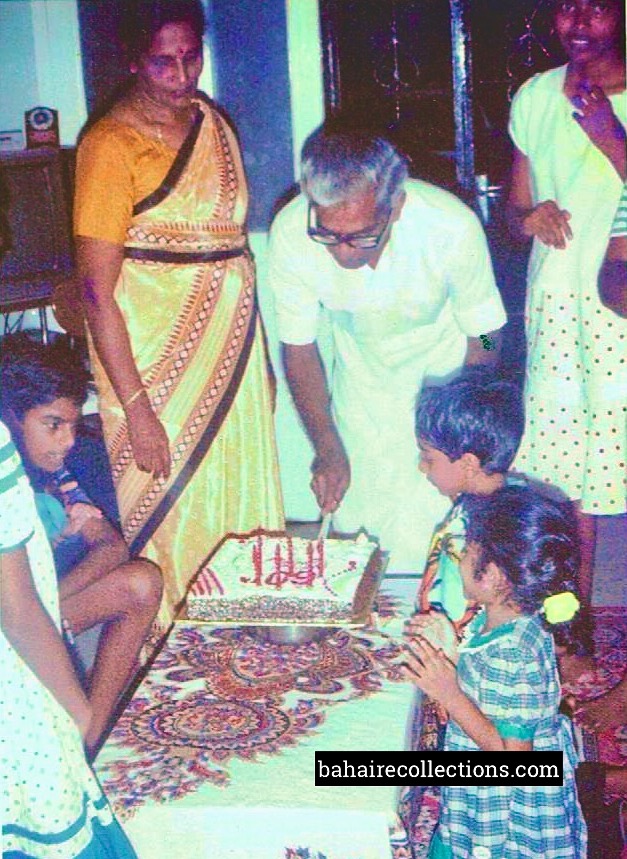
Celebrating his 60th birthday, 1990
A sudden heart attack came upon Karuppiah and he passed away at the age of sixty-two on 24 May 1992, having served on the Local Spiritual Assembly for a record period of thirty-one years. He was buried at the Malacca Bahá’í Memorial Park following a befitting Bahá’í funeral, attended by a large crowd of believers and non-believers. Thus ended the life of a simple man Karuppiah who was firm like an immovable mountain. He stood steadfast till the end of his life always upholding with all his might the good name of the Faith, which he loved and served with all sincerity. Till this day people who had associated with Karuppiah speak the same language, that Karuppiah had never harbored ill thoughts on anyone, and there were no reported incidents of he backbiting either. His wife Ponnayee who had been with him as his greatest supporter and strength in every moment and phase of his life ascended to the Abhá Kingdom on 10 December 2017 and was buried in the Malacca Bahá’í Memorial Park on 13 December 2017.
Karuppiah’s area of service was mainly confined to the town of Muar, but his services were noised across the country, and whenever outstation believers were traveling through Muar, they made it a point to call upon him. Karuppiah was a God-fearing believer who placed complete trust in God, and one whose face was always radiant and spoke with a magnetic smile that attracted everyone. Karuppiah’s is a story of an ordinary and simple man having overflowing love for the Faith, developing a high sense of loyalty and firmness in the Cause, single-handedly withstanding mighty opposition, undertaking individual initiatives as a lonely worker in the early days, and above all, winning the hearts and minds of the very community that opposed him. The example he had set shall forever decorate the pages of history.
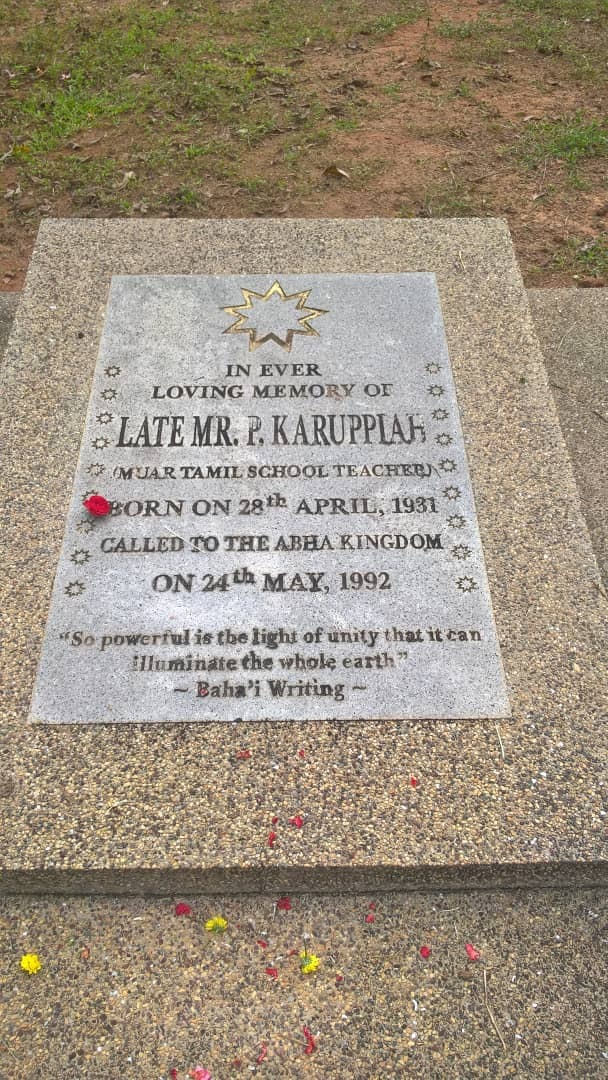
Resting place of Karuppiah, Bahá’í Memorial Garden, Malacca
A. Manisegaran
29 February 2020
Copyright©bahairecollections.com